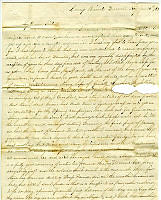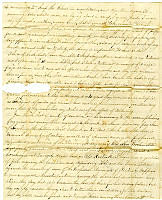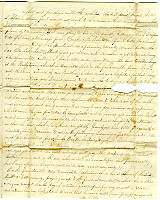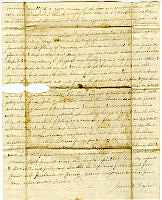James M. Taylor to Mary Taylor, Taylor Family Papers (Part 1 of 4)
This is a letter of Corporal James M. Taylor at Danville, Kentucky, to his sister Mary Taylor in Lake County, Illinois, dated January 20, 1863. Taylor served in the U.S. Army, a member of the 96th Illinois Infantry Regiment. He was promoted to the rank of sergeant and mustered out of the service in 1864 after suffering a wound in his arm. Taylor survived the resulting gangrene and arm amputation. In the letter Taylor describes the reaction of fellow soldiers and Kentuckians to the Emancipation Proclamation. He defended the proclamation while also recognizing the difficulties ahead for a post-slavery South. Taylor saw colonization of freed slaves as a possible solution.




